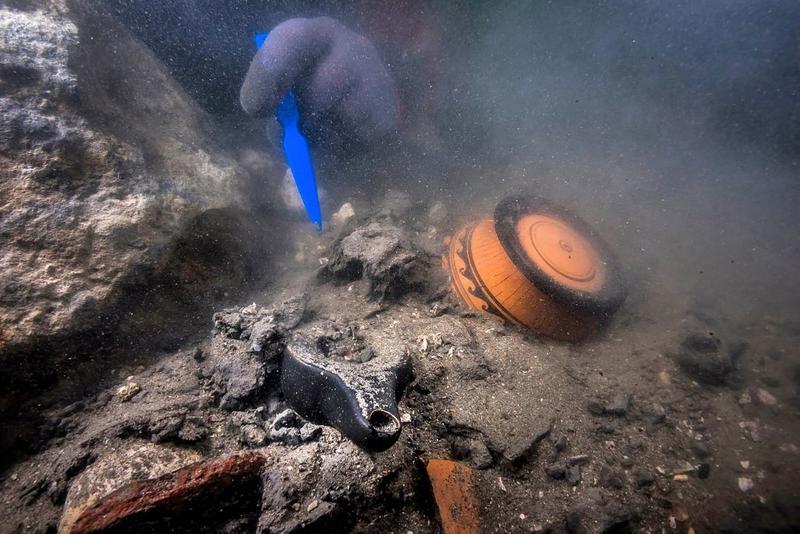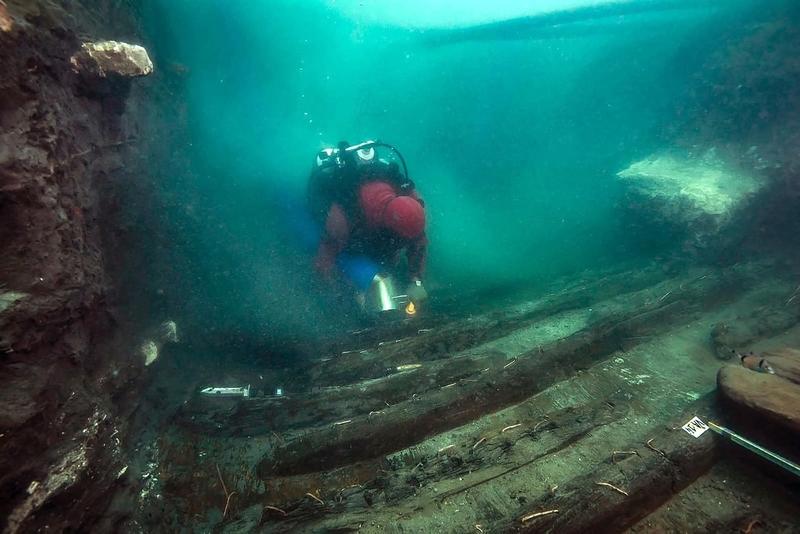 A picture released by the Egyptian Ministry of Tourism and Antiquities on July 19, 2021 shows a diver unearthing pieces of pottery in the sunken city of Thonis-Heracleion in Abu Qir bay, on Egypt's northern Mediterranean coast. (PHOTO / AFP)
A picture released by the Egyptian Ministry of Tourism and Antiquities on July 19, 2021 shows a diver unearthing pieces of pottery in the sunken city of Thonis-Heracleion in Abu Qir bay, on Egypt's northern Mediterranean coast. (PHOTO / AFP)
CAIRO - Divers have discovered rare remains of a military vessel in the ancient sunken city of Thônis-Heracleion - once Egypt's largest port on the Mediterranean - and a funerary complex illustrating the presence of Greek merchants, the country said on Monday.
The city, which controlled the entrance to Egypt at the mouth of a western branch of the Nile, dominated the area for centuries before the foundation of Alexandria nearby by Alexander the Great in 331 BC.
Destroyed and sunk along with a wide area of the Nile delta by several earthquakes and tidal waves, Thônis-Heracleion was rediscovered in 2001 in Abu Qir bay near Alexandria, now Egypt's second largest city.
Destroyed and sunk along with a wide area of the Nile delta by several earthquakes and tidal waves, Thônis-Heracleion was rediscovered in 2001 in Abu Qir bay near Alexandria, now Egypt's second largest city
ALSO READ: Asian countries enhance protection of cultural relics
The military vessel, discovered by an Egyptian-French mission led by the European Institute for Underwater Archaeology (IEASM), sank when the famed temple of Amun it was mooring next to collapsed in the second century BC.
A preliminary study shows the hull of the 25-metre flat-bottomed ship, with oars and a large sail, was built in the classical tradition and also had features of Ancient Egyptian construction, Egypt's tourism and antiquities ministry said.
 A handout picture released by the Egyptian Ministry of Tourism and Antiquities (MOA) on July 19, 2021 shows a diver exploring the hull of a military vessel discovered in the sunken city of Thonis-Heracleion in Abu Qir bay, on Egypt's northern Mediterranean coast. (PHOTO / AFP)
A handout picture released by the Egyptian Ministry of Tourism and Antiquities (MOA) on July 19, 2021 shows a diver exploring the hull of a military vessel discovered in the sunken city of Thonis-Heracleion in Abu Qir bay, on Egypt's northern Mediterranean coast. (PHOTO / AFP)
READ MORE: Chinese relics found in wrecks off Singapore
In another part of the city, the mission revealed the remains of a large Greek funerary area dating back to the first years of the 4th century BC, it said.
"This discovery beautifully illustrates the presence of the Greek merchants who lived in that city," the ministry said, adding that the Greeks were allowed to settle there during the late Pharaonic dynasties.
"They built their own sanctuaries close to the huge temple of Amun. Those were destroyed, simultaneously and their remains are found mixed with those of the Egyptian temple."


